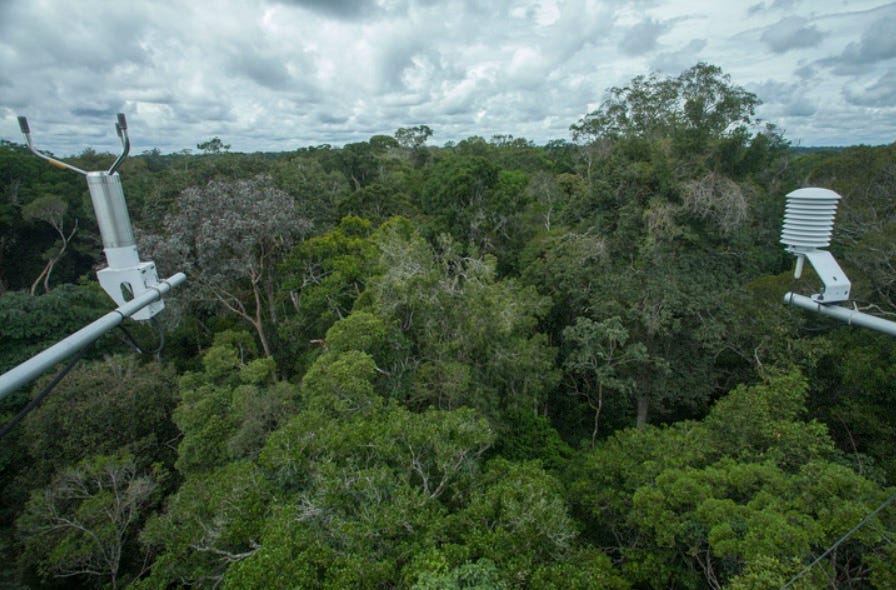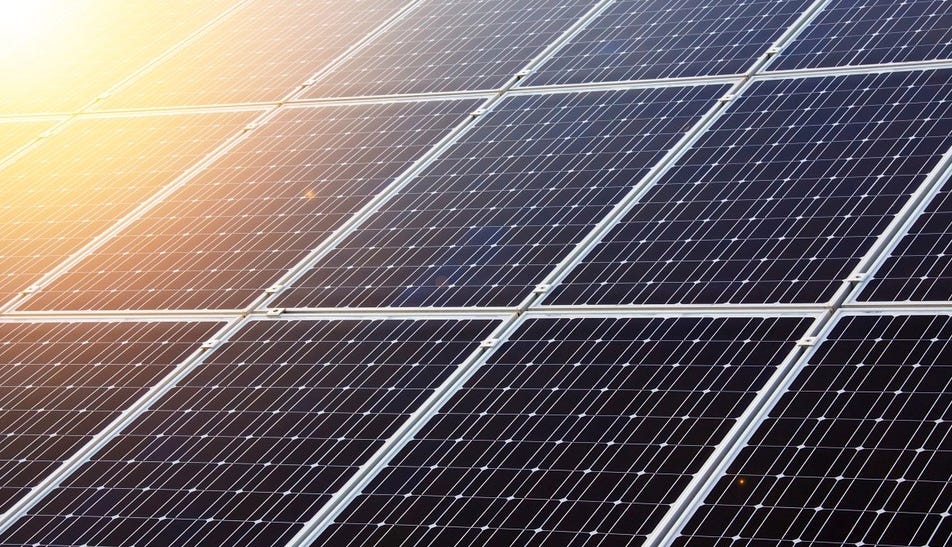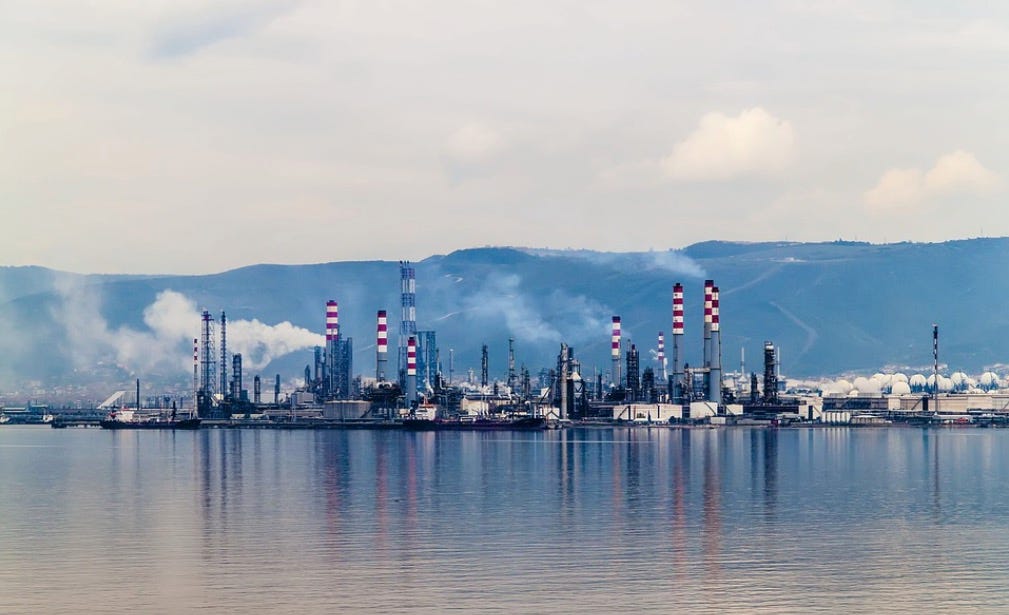Here's what the top emissions-cutting companies all have in common
Happy Memorial Day Weekend from Callaway Climate Insights. We honor those who served and sacrificed for our country.
Today’s edition is free. To read our insights and support our great climate finance journalism four days a week, subscribe now for full access.
Who’s ready for a summer road trip? According to AAA, Memorial Day road trips are up 6% over last year. An estimated 37 million Americans will drive to their destinations, an increase of more than 2 million. Gas prices are lower compared to last year, when the national average was more than $4 a gallon. Above is a U.S. detail from a map showing the roads of the world. Primary roads are in white, secondary roads are in yellow and tertiary roads are in red. The global map shows 21.6 million km of road. See the full map at Visual Capitalist. Data source: Global patterns of current and future road infrastructure. @PythonMaps.
Despite the controversy over proposed new rules to require public companies to report the carbon emissions of their supply chains and vendors, almost all of the U.S. companies making the most progress in reducing their carbon footprints are already doing it, according to a new study by my former news group USA Today.
All of the top 10 companies, starting with leader T-Mobile TMUS 0.00%↑ , report so-called Scope 3 emissions and eighty-nine of the top 100 do, including companies such as JPMorgan Chase JPM 0.00%↑ , Advanced Micro Devices AMD 0.00%↑ , and even Newmont Corp. NEM 0.00%↑ , the gold miner, according to the list, which was compiled with research company Statista.
These aren’t companies just buying carbon offsets to obscure their pollution, although some of the 400 companies on the list no doubt include some offsetting as a practice. They are actually cutting what they release into the air and water, in a dozen cases by more than 50%.
The fact that they report Scope 3 emissions illustrates the importance of that measure in how a company works to cut its pollution. It also shows that it’s relatively easy to do, which is at the heart of the firestorm over the Securities and Exchange Commission’s proposed rules to mandate the practice.
These are not small companies. Some are the largest in the world. Wherever the legal battle over the SEC rules leads, the fact is that investors will increasingly expect their companies to report these emissions and the best ones will benefit from that.
Don’t forget to contact me directly if you have suggestions or ideas at dcallaway@callawayclimateinsights.com.
Follow us . . . .
Twitter | LinkedIn | Facebook | Instagram
The real reason some ESG funds outperform
. . . . Environmental, social and governance (ESG) funds have long boasted out-performance over non-ESG funds, arguing that betting on companies that seek to do well will lead to higher profits. But Mark Hulbert has found a study that might explain the out-performance in a less satisfying way, and one that is sure to raise hackles at many fund companies. . . .
Will the UN beat plastic pollution in Paris?
. . . . Forget COP28. Next week the United Nations hosts the biggest plastic pollution conference of the year in Paris, and government representatives from around the world are expected to bring a host of new and existing ways to cut usage of plastics and clean up the oceans. But guest commentators Doug Woodring and Steve Russell argue the conference is missing a bigger chance to solve this pressing environmental problem. They argue that instead of stopgap solutions, the world needs to develop a circular plastic economy that will encourage re-usage, trade and recycling of vital plastics to reduce waste and create market opportunities. Stay tuned. . . .
Thursday’s market insights
. . . . Money talks, and the numbers are saying it out loud: Investment in solar power is due to overtake that in oil production in the near future, reports the IEA. However, coal investments — that’s mainly you, China — are still too high to meet net-zero goals. Read more. . . .
. . . . It’s a tale of two AGMs, where the drama at companies at the center of the ESG world was on full display this week. First up is BlackRock, which prevailed over shareholder activists, while Shell’s CEO had to be protected when protesters disrupted their yearly confab. Read more. . . .
. . . . Shares of rare earths company MP Materials MP 0.00%↑, which we own as part of a climate finance portfolio, are down about 10% this year and 41% in the past 12 months. Seeking Alpha says they are poised to rebound and at least one MP executive concurs. Chief Operating Officer Rosenthal Michael Stuart purchased 20,000 shares in the last for more than $430,000, ahead of the company’s annual meeting on June 13, according to Callaway Climate Insights partner InsideArbitrage, sourcing SEC filings. The purchases come as the shares hover near 52-week lows. For more information on Callaway Climate Index shares on InsideArbitrage, or to subscribe, click here. . . .
Editor’s picks: Reading the FACE of the Amazon rainforest

Free-Air CO₂ Enrichment in the Amazon
At a research station near Manaus, Brazil, a field experiment of unprecedented scope will expose an old-growth Amazon forest to the CO₂ concentration of the future, using what is known as Free-Air CO₂ Enrichment, or FACE, technology. The AmazonFACE project is led by the National Institute for Amazon Research and many other partners around the world seeking to understand more about the world’s largest rainforest in light of climate change, and the use of that knowledge to guide regional policies on mitigation and adaptation to climate change. The AmazonFACE experiment involves construction of six FACE rings, three of which are “treatment,” with an atmosphere enriched in CO₂, while the other three rings are for control, with ambient air aspersion. AmazonFACE is an innovative project to understand how the Amazon Rainforest can respond to climate changes predicted for the coming years. It will be one of the largest open-air laboratories in the world, and will address a critical gap in international climate science research. Watch a video presentation on this project.
What a wetter winter means for fire season
As the Broadway tune goes, it’s not where you start, it’s where you finish. And that’s particularly apropos for the 2023 fire season, experts say. The heavy rains and snowfall of this past winter dampen the chances for major fires early in the season, but the spring and summer growth that moisture provides could fuel even bigger wildfires later in the year. NBC News reports many areas of California and the Great Basin got more than twice the usual amount of snow, and researchers expect the snowpack’s melt to keep fuels from drying out quickly. But wetter winters can boost wildfire intensity by creating more fuel. Most western states had wet years, but parts of the Pacific Northwest did not. In western states, the fire season is becoming longer and fires more intense, researchers say.
Latest findings: New research, studies and projects
‘Abominable’ bookkeeping
The oil and gas sector plays a critical role in achieving the transition goals of the Paris Agreement, but most of the companies’ bookkeeping with regard to emissions reporting is “abominable,” write the authors of this research titled Abominable Greenhouse Gas Bookkeeping Casts Serious Doubts on Climate Intentions of Oil and Gas Companies. From the abstract: “Understanding progress in emission reductions in the private sector relies on the disclosure of corporate climate-related data, and the Carbon Disclosure Project (CDP) is considered a leader in this area. Companies report voluntarily to CDP, providing total emissions and breakdowns into categories. How reliable are these accounts? Here, we show that their reliability is likely very poor. A significant proportion of Oil & Gas companies’ emission reports between 2010 and 2019 fail a 'simple summation' mathematical test that identifies if the breakdowns add up to the totals. Companies’ reports reflect unbalanced internal bookkeeping in 38.9% of cases, which suggests worryingly low quality standards for data guiding the private sector's contribution to halting climate change.” Authors: Sergio García Vega, University College Dublin; Andreas G. F. Hoepner, Smurfit Graduate Business School, University College Dublin; European Commission's Platform on Sustainable Finance; Joeri Rogelj, International Institute for Applied Systems Analysis; and Frank Schiemann, University of Bamberg.
More of the latest research:
Mitigation of Greenhouse Gas Emissions in Dairy-Beef Production Systems
The Impact of Global Warming on Inflation: Averages, Seasonality and Extremes
Words to live by . . . .
“Progress is impossible without change, and those who cannot change their minds cannot change anything.” — George Bernard Shaw.







